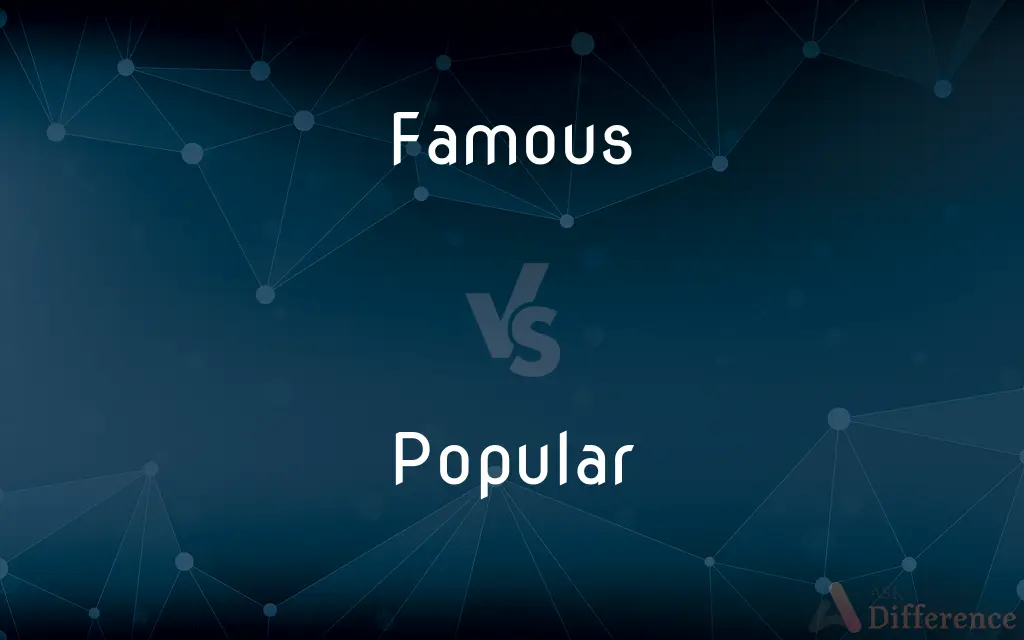Famous vs. Popular — What's the Difference?
Edited by Tayyaba Rehman — By Urooj Arif — Updated on March 15, 2024
Famous individuals are widely recognized, while popular ones are liked by many.

Difference Between Famous and Popular
Table of Contents
ADVERTISEMENT
Key Differences
Being famous means having widespread recognition or fame, often resulting from one's achievements, talents, or notable actions. This status doesn't necessarily imply positive regard; one can be famous for reasons not universally admired. On the other hand, popularity is characterized by being liked, admired, or supported by a large number of people. It often involves a positive emotional connection from the public or a specific group.
Famous people are known by many, regardless of the public's personal feelings toward them. Their fame could stem from various fields such as entertainment, politics, or history, and their notoriety can be global. Conversely, popular individuals are specifically characterized by their ability to garner affection or approval from a significant audience. Their popularity might be confined to specific circles or communities, and unlike fame, it suggests a positive perception.
The distinction also lies in the longevity and basis of their recognition. Fame can be enduring, remembered across generations for significant contributions or historical actions. Popularity, however, can be fleeting, often subject to current trends, public opinion, and social media presence. While a famous figure's impact is lasting, a popular person's influence may wane as public interests shift.
Fame and popularity intersect but do not always coincide. A person can be famous without being widely popular, as in the case of historical figures who are known for controversial reasons. Conversely, someone can be popular within a specific community or context without being broadly recognized on a national or international scale.
The path to becoming famous often involves a significant achievement or a body of work that has a wide-reaching impact, while achieving popularity might hinge more on personal attributes, relatability, or engaging with a specific audience effectively. This distinction highlights how individuals can navigate their social standing and influence differently.
ADVERTISEMENT
Comparison Chart
Basis of Status
Recognition from achievements or notoriety
Liked or admired by many
Perception
Not always positive
Generally positive
Scope
Can be global
Often confined to specific groups
Longevity
Can be enduring across generations
Can be fleeting, influenced by trends
Requirement
Significant achievements or impact
Ability to garner affection/approval
Compare with Definitions
Famous
Having a reputation, often of a significant nature.
The scientist became famous for her groundbreaking research.
Popular
Widespread acceptance or use.
The app became popular among teenagers for its unique features.
Famous
Widely known or recognized by many people.
The famous artist's work was known globally.
Popular
Common or prevalent among a specific group.
The band was popular in the indie music scene.
Famous
Celebrity status in various fields.
The famous actor received numerous awards for his performances.
Popular
Enjoying widespread favor or approval.
The policy was popular for its positive impact on the community.
Famous
Historical significance leading to lasting fame.
The explorer was famous for discovering new lands.
Popular
Characterized by being in vogue or trendy.
The fashion trend became popular overnight.
Famous
Known widely in a negative context.
The dictator was famous for his tyrannical rule.
Popular
Liked, admired, or supported by many people.
The popular teacher was known for her engaging classes.
Famous
Well or widely known.
Popular
Widely liked or appreciated
A popular resort.
Famous
First-rate; excellent
Had a famous time at the party.
Popular
Liked by acquaintances; sought after for company
"Beware of over-great pleasure in being popular or even beloved" (Margaret Fuller).
Famous
Known.
Popular
Of, representing, or carried on by the people at large
The popular vote.
Famous
In the public eye.
Some people are only famous within their city.
Popular
Fit for, adapted to, or reflecting the taste of the people at large
Popular entertainment.
Popular science.
Famous
To make famous; to bring renown to.
Popular
Accepted by or prevalent among the people in general
A popular misunderstanding of the issue.
Famous
Celebrated in fame or public report; renowned; mach talked of; distinguished in story; - used in either a good or a bad sense, chiefly the former; often followed by for; as, famous for erudition, for eloquence, for military skill; a famous pirate.
Famous for a scolding tongue.
Popular
Suited to or within the means of ordinary people
Popular prices.
Famous
Widely known and esteemed;
A famous actor
A celebrated musician
A famed scientist
An illustrious judge
A notable historian
A renowned painter
Popular
Originating among the people
Popular legend.
Popular
Common among the general public; generally accepted.
Popular
(legal) Concerning the people; public.
Popular
Pertaining to or deriving from the people or general public.
Popular
(obsolete) Of low birth, not noble; vulgar, plebian.
Popular
Aimed at ordinary people, as opposed to specialists etc.; intended for general consumption.
Popular
(obsolete) Cultivating the favour of the common people.
Popular
Liked by many people; generally pleasing, widely admired.
Popular
Adapted to the means of the common people; cheap.
Popular
A person who is popular, especially at a school.
Popular
An inexpensive newspaper with wide circulation.
Popular
A member of the Populares
Popular
Of or pertaining to the common people, or to the whole body of the people, as distinguished from a select portion; as, the popular voice; popular elections.
The men commonly held in popular estimation are greatest at a distance.
Popular
Suitable to common people; easy to be comprehended; not abstruse; familiar; plain.
Homilies are plain popular instructions.
Popular
Adapted to the means of the common people; possessed or obtainable by the many; hence, cheap; common; ordinary; inferior; as, popular prices; popular amusements.
The smallest figs, called popular figs, . . . are, of all others, the basest and of least account.
Popular
Beloved or approved by the people; pleasing to people in general, or to many people; as, a popular preacher; a popular law; a popular administration.
Popular
Devoted to the common people; studious of the favor of the populace.
Such popular humanity is treason.
Popular
Prevailing among the people; epidemic; as, a popular disease.
Popular
Regarded with great favor, approval, or affection especially by the general public;
A popular tourist attraction
A popular girl
Cabbage patch dolls are no longer popular
Popular
Carried on by or for the people (or citizens) at large;
The popular vote
Popular representation
Institutions of popular government
Popular
Representing or appealing to or adapted for the benefit of the people at large;
Democratic art forms
A democratic or popular movement
Popular thought
Popular science
Popular fiction
Popular
Comprehensible to the general public;
Written for the popular press in plain nontechnical language
Popular
(of music or art) new and of general appeal (especially among young people)
Common Curiosities
How is popularity different from fame?
Popularity is about being liked or admired by a significant number of people, suggesting a positive perception, whereas fame is about widespread recognition, which may not always be positive.
Do famous people always have influence?
Famous individuals often have a platform and the potential for influence, but their actual impact can vary based on their actions and the public's reception.
Can someone be famous and not popular?
Yes, it's possible to be famous for reasons that don't necessarily endear one to the public, resulting in recognition without widespread affection.
Is fame or popularity more enduring?
Fame tends to be more enduring, as it can be based on significant contributions or historical actions, while popularity can be more susceptible to changes in public opinion or trends.
What leads to popularity?
Popularity often results from personal qualities, relatability, or achievements that resonate positively with a specific audience or the general public.
Can popularity influence one's career or opportunities?
Yes, popularity can open doors and create opportunities by attracting support, resources, and favorable attention in various fields.
What makes someone famous?
Someone becomes famous through widespread recognition, often due to their achievements, talents, or notable contributions to society.
Is popularity always a positive attribute?
While popularity generally implies a positive perception, it can also attract criticism or negative attention, depending on the context.
Can a person's popularity become fame?
Yes, if a person's popularity is due to achievements or qualities that gain wide recognition and lasting impact, it can transition into fame.
How do social media influence fame and popularity?
Social media can rapidly amplify both fame and popularity by increasing visibility and engagement with a global audience, influencing public perception.
How do cultures differ in their perception of fame and popularity?
Cultural values and societal norms can influence what qualities lead to fame or popularity, and how each is valued or perceived within different communities.
Can historical figures be considered popular?
Historical figures can be considered popular if their legacy or actions continue to elicit widespread admiration or approval in contemporary times.
How do trends affect popularity?
Trends can significantly affect popularity by shaping public interests and perceptions, making certain individuals or ideas popular for a time.
Why might someone prefer being popular over being famous?
Someone might prefer popularity for its positive connotations and the personal satisfaction of being liked or admired by others.
Is it possible to measure fame or popularity accurately?
While difficult to measure precisely due to their subjective and variable nature, social media metrics, polls, and other indicators can provide insights into an individual's fame or popularity.
Share Your Discovery

Previous Comparison
Deprioritised vs. Deprioritized
Next Comparison
Lactose vs. LactaseAuthor Spotlight
Written by
Urooj ArifUrooj is a skilled content writer at Ask Difference, known for her exceptional ability to simplify complex topics into engaging and informative content. With a passion for research and a flair for clear, concise writing, she consistently delivers articles that resonate with our diverse audience.
Edited by
Tayyaba RehmanTayyaba Rehman is a distinguished writer, currently serving as a primary contributor to askdifference.com. As a researcher in semantics and etymology, Tayyaba's passion for the complexity of languages and their distinctions has found a perfect home on the platform. Tayyaba delves into the intricacies of language, distinguishing between commonly confused words and phrases, thereby providing clarity for readers worldwide.
















































